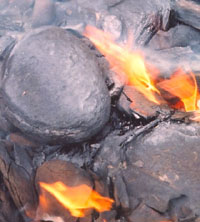
Photo from wikipedia
Abstract Pitch oil production from Scots pine (Pinus sylvestris L.) resinous wood is an intangible cultural heritage in the Central European region including the Czech Republic, Northern Austria and South… Click to show full abstract
Abstract Pitch oil production from Scots pine (Pinus sylvestris L.) resinous wood is an intangible cultural heritage in the Central European region including the Czech Republic, Northern Austria and South Eastern Germany, and is related to traditions in Finland and Southern France. The heating of wood in small kilns also fueled by wood produces liquid for collection. Our detailed investigations of three pitch oil kilns in Upper Austria led to the discovery of relationships to the production of pine and birch tar in Fennoscandia and black pine tar production in Western Anatolia. Our measurements of temperatures at the bases of the kilns revealed a slow temperature rise. We predicted maximum temperatures based on infrared spectra, and measured overall temperatures in the range of 250 °C–650 °C. With gas chromatographic analyses of pitch oil we detected a dominant proportion of resin components and only a minor proportion of compounds attributable to pyrolytic transformation of solid wood mass. In most pitch oil samples the extractives comprised 90 %. Most samples were similar and only the first samples at the starting outflow were systematically dominated by pyrolysis products. Tar runoff from a traditional circular charcoal kiln for charcoal production – used as a reference – had a strongly different composition, with a high proportion of pyrolysis compounds.
Journal Title: Journal of Analytical and Applied Pyrolysis
Year Published: 2021
Link to full text (if available)
Share on Social Media: Sign Up to like & get
recommendations!